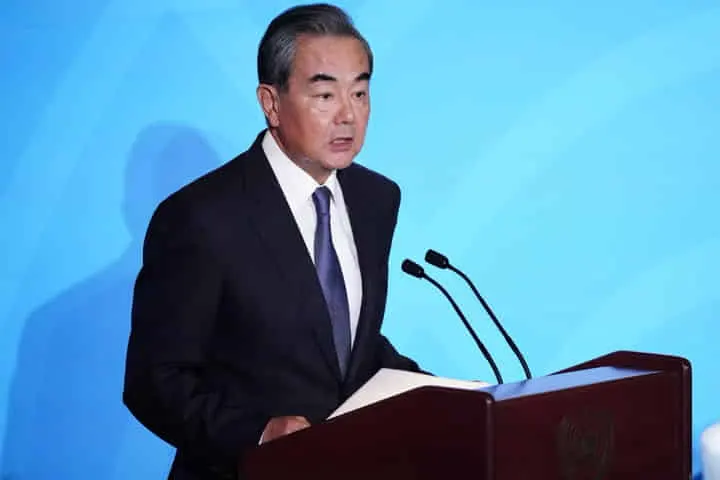

China’s State Councillor and foreign minister Wang Yi’s pitch to lift sanctions on Taliban is a thinly argued case, based on sweeping conclusions
<p>
China&rsquo;s State Councillor and foreign minister Wang Yi&rsquo;s pitch to lift sanctions against the&nbsp; Taliban is a thinly argued case, based on sweeping conclusions.</p>
<p>
Speaking at a virtual G-20 meeting on Afghanistan, Wang&nbsp; said that economic sanctions against Afghanistan must end, the Chinese foreign ministry said in a statement&nbsp; citing its top diplomat.</p>
<p>
The subtext of the Chinese argument is that the&nbsp; Taliban have formed a legitimate government that somehow reflects the popular will.</p>
<p>
Last month Chinese foreign ministry spokesperson Hua Chunying said after the Taliban swept into&nbsp; power that &ldquo;China respects the right of the Afghan people to independently determine their own destiny and is willing to continue to develop … friendly and cooperative relations with Afghanistan.&rdquo;</p>
<p>
So did&nbsp; the Afghan people &ldquo;independently determine&rdquo; whether they wanted the Taliban to be their legitimate ruler? Certainly not. On the contrary, by all standards of democracy, the Taliban have failed the legitimacy test. Neither have they been elected, nor has their rule been legitimised through a referendum or any other form of democratic validation by the people of Afghanistan</p>
<p>
In fact, the illegitimacy of the Taliban &ldquo;caretaker government&rdquo; is startling. The final line up of the governmental ministers&nbsp; has been handpicked by Pakistan&rsquo;s Inter-Services Intelligence. It is a matter of record that Pakistan&rsquo;s spy chief, Faiz Hameed was flown into Kabul to cobble together a pro-Islamabad government after fistfights broke out in various factions of the Taliban over the distribution of portfolios. Following the fracas, Hameed ensured that the more &ldquo;moderate&rdquo; Doha faction represented by the likes of Mullah Baradari and Sher Mohammad Abbas Stanikzai was completely side-lined. Instead, luminaries of the Haqqani network&mdash;a proven asset of the ISI, known for establishing their narco-terror empire in the AfPak Badlands –got plum posts. Consequently, the Haqqanis formed the core of the new pro-Pak government in Kabul. .</p>
<p>
Further, the illegitimacy of the Kabul government is blaring&nbsp; as it excluded the country&rsquo;s sizable minorities, including ethnic Tajiks, Hazaras and Uzbeks from positions of power, leaving almost entirely the majority Pashtuns in the cockpit.&nbsp;</p>
<p>
Yet, China is batting for the Pak backed narco-dictatorship that has seized power in Afghanistan.</p>
<p>
By calling for the lifting of sanctions that would primarily benefit the dangerous Haqqanis, China&rsquo;s approach smacks of crass opportunism.&nbsp; Haqqanis have blood on their hands and bounties over their heads. But the mandarins from Beijing&nbsp; hope that by entering into a Faustian bargain with the Haqqanis and their underwriters in Pakistan, they would manage to taper down support for the Uyghur separatism in Xinjiang, even if it meant feeding international terror.</p>
<p>
In the end, China is supporting an illegitimate Taliban in the&nbsp; hope that its unprincipled approach&nbsp; would help fulfil its grand geo-economic and geopolitical ambitions.&nbsp;</p>
<p>
It is well-known that, lured by Afghanistan&rsquo;s vast resources, the Chinese want to raise a vast geo-economic empire with an extended China Pakistan Economic Corridor (CPEC) as its vital artery. The Taliban is well aware of the Chinese ambition. Taliban spokesperson Suhail Shaheen has been quoted as saying that Afghanistan wants to be incorporated in the CPEC. So far CPEC starts from the Pakistani port of Gwadar in the South and terminates north at Kashgar in China&rsquo;s Xinjiang region. A spur can be added which will extend CPEC into neighbouring Afghanistan, allowing the flow of Afghan minerals and raw materials to Gwadar port in the Arabian Sea.</p>
<p>
&quot;China is a big country with a huge economy and capacity &mdash; I think they can play a very big role in the rebuilding, rehabilitation, reconstruction of Afghanistan,&quot;&nbsp;&nbsp; Shaheen told China Global Television Network (CGTN), mirroring an illegitimate Taliban&rsquo;s quest for finding a reliable and supportive big power that approves of its fractious dictatorship.</p>
<p>
<strong>Also Read: <a href="https://www.indianarrative.com/latest-news/agriculture-research-essential-for-food-security-tomar-at-g-meet-115698.html">Agriculture research essential for food security: Tomar at G20 meet</a></strong></p>
The Ministry of External Affairs (MEA) has said that the United States Commission on International…
Human rights defenders from various parts of India commended the country's significant progress across multiple…
The central organiser of the Baloch Women Forum (BWF), Dr. Shalee Baloch, has urged Baloch…
The Office of Tibet in London hosted a group of 15 students from the University…
The Baloch National Movement (BNM) organised a protest rally in Hanover, Germany, to mark the…
The Human Rights Focus Pakistan (HRFP) on Wednesday released a damning report on the first…